How Our Reality Show President Is Changing The Way Politics And Culture Mix
WASHINGTON ― President Donald Trump opened his first Cabinet meeting of 2018 by turning to the television cameras and telling reporters, “Welcome back to the studio.”
He went on to remark that after the previous day’s nearly hourlong public meeting with congressional leaders, “my performance got good reviews.” (That “performance” got overshadowed later in the week, when reports of a private meeting turned into a battle over exactly what phrase the president used in expressing racist views on immigration.)
President Trump in Cabinet Room: "Welcome back to the studio." pic.twitter.com/jjZoJfrCq2
— CSPAN (@cspan) January 10, 2018
It’s no secret that Trump, who buffed the image of himself as a successful businessman while hosting “The Apprentice,” likes the performative aspects of being president much more than the governing part.
The idea of Trump now running a reality show out of the Oval Office provides a compelling and perhaps essential lens to view his first year as president. His take on the role may even be creating new ways of understanding politics, according to academics who have observed how politicians wield culture for political ends.
Trump stokes the culture wars to please his viewing base.
With relatively few legislative successes to tout, Trump often gooses his ratings by stoking cultural grievances, from feuding with liberal celebrities to denouncing athletes kneeling in protest during the national anthem, from lamenting the removal of “beautiful” Confederate monuments to declaring an end to the non-existent “War on Christmas” — all issues that are red meat for his base.
Presidents have long addressed our cultural divisions, and Republicans, especially social conservatives, continue to use cultural debates as wedge issues. But the mainstream GOP “had moved away from the most virulent strains of the culture wars” over the last decade or two, according to Karrin Vasby Anderson, a Colorado State University professor who has studied the intersection of political communication and culture.
And then Trump revved the engines again.
“It seemed like that part of the cultural wars was done in the 2010s — those [issues] are political losers right now,” Anderson said. “But Trump came in and said, ‘I don’t think those are political losers. I think there are a lot of people who are really mad that they can’t say that stuff, so I’m going to say that stuff and they’re going to like what they hear.’”
That kind of “tell it like it is” bluntness has always appealed to his base, even when Trump’s actual claims are false. Indeed, the president has often promoted his mere taking of cultural stands as real achievements.
“You’re never going to pass a piece of legislation that says people can or can’t say ‘Merry Christmas,’ right? So he knows that’s going to be an easy win for him because it didn’t require him to do anything,” Anderson said of Trump proclaiming that as president, he has freed people to say “Merry Christmas” again.
People are proud to be saying Merry Christmas again. I am proud to have led the charge against the assault of our cherished and beautiful phrase. MERRY CHRISTMAS!!!!!
— Donald J. Trump (@realDonaldTrump) December 25, 2017
For Syracuse University communications professor Kendall Phillips, Trump’s lack of substance is part of what drives his reliance on cultural disputes.
“There was no substance in the campaign. There has been no substance in the White House, at this point. There’s no coherent policy. There’s no ‘there’ there,” said Phillips, who taught a course last fall connecting the president, rhetoric and pop culture.
But culture wars can thrive on passionate language aimed at despicable foes.
“Think about Trump’s performance in the debates,” the professor added. “There were insults and platitudes, and that’s how he’s governing.” Trump is “all about the spectacle.”
With the president’s declaration that the war on Christmas is over, for instance, “it’s not that he’s pushing a Christian agenda,” Phillips said. “It’s the spectacle of that kind of Christianity.”
A key part of this show is the vigorous antagonism, which Phillips said appeals to Trump’s core supporters because “his antagonisms are their antagonisms.” he said.
“Everything he’s pushing is against ‘them,’ whoever they are,” Phillips said. “It’s not ‘Let’s say Merry Christmas because it’s important.’ It’s ’Now we can say Merry Christmas because they wouldn’t let us before.’”
Trump is “treating the presidency like a reality show.”
All of these factors come together in the president’s background as a reality TV performer, Phillips said.
“It’s all about the spectacle of conflict. We don’t tune in to ‘Real Housewives’ because we want to see them get along or have a substantive conversation. The promos are always ‘Oh my God, you won’t believe what they said next!’ — which is what the White House is now,” he said.
Love HuffPost? Become a founding member of HuffPost Plus today.
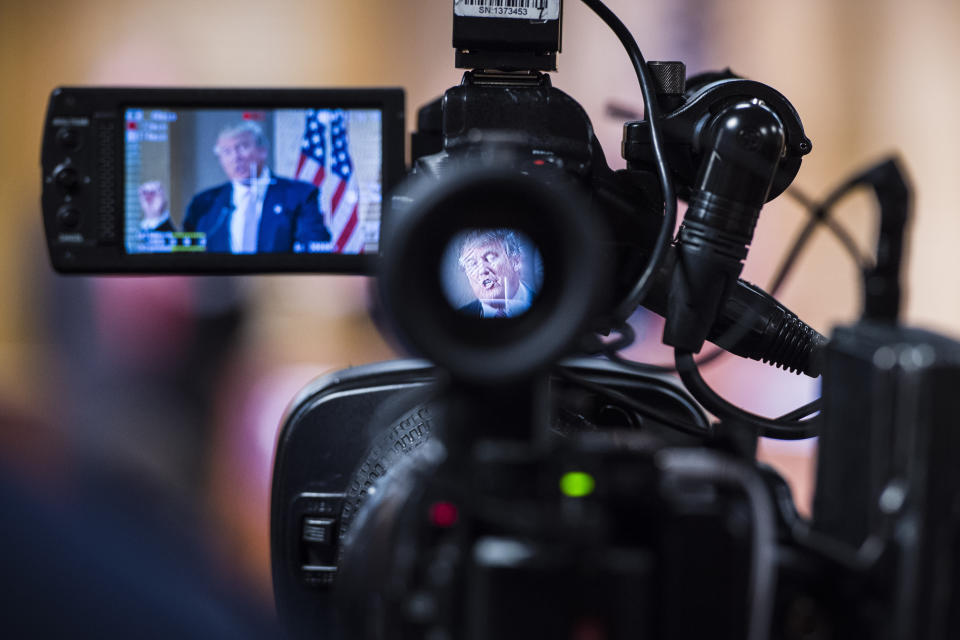
Of course, the reality TV framework, as well as other cultural and political elements that contributed to Trump’s rise, existed before he took the political stage, Anderson said. And earlier presidents ― notably Ronald Reagan ― used television, performance and celebrity to their advantage.
But there’s a key difference between, say, Reagan and Trump.
“He knew how to play the presidential role,” Phillips said of Reagan. “Trump doesn’t even pretend to play the presidential role. There’s almost no difference between Trump now and when he was on TV.”
Or as Anderson put it, while Reagan and other politicians may have incorporated elements of “classic narrative television” in their political efforts, Trump is the first who is “treating the presidency like a reality show.”
The Trump show could change everything.
The U.S. has never had a president before with Trump’s “level of television celebrity,” Phillips said. “Everything in political rhetoric is warped by that center of gravity.”
The demands of this reality TV presidency are creating a whole new way of thinking about politics, influencing choices of candidates as well as media coverage. “The narrative frameworks that shape the way we talk about politics are more important and impactful than a lot of people realize,” Anderson said.
Not only is Trump using reality TV strategies, she said, but now he’s “influencing our media to, in some ways, cover his presidency like a reality show.” Every development now feels like an “unexpected turn” in the Trump show.
That framework, combined with partisan divisions, also might be bringing out more candidates ready to offer extreme views, Anderson suggested.
“What we’re really doing as a country right now is saying we’re not interested in having experienced, lifelong public servants in these kinds of positions,” she said. “We want outrageous people in these positions because that’s also what we want in a reality show.”
We may also want celebrities. Anderson cited recent speculation that Oprah Winfrey might run for the presidency.
“It indicates that not only do you now have to be famous to run for president — name recognition has always been an issue with presidential candidates — but you might pretty soon have to also be a celebrity, and perhaps an independently wealthy one, and that would be a really shocking transition in U.S. politics,” Anderson said. In fact, she suggested it was “dangerous.”
American democracy is still struggling to catch up with Trump’s reality show tactics.
“We’re just starting to wrap our heads around what’s happening now,” she said.
Also on HuffPost
"The Candidate"
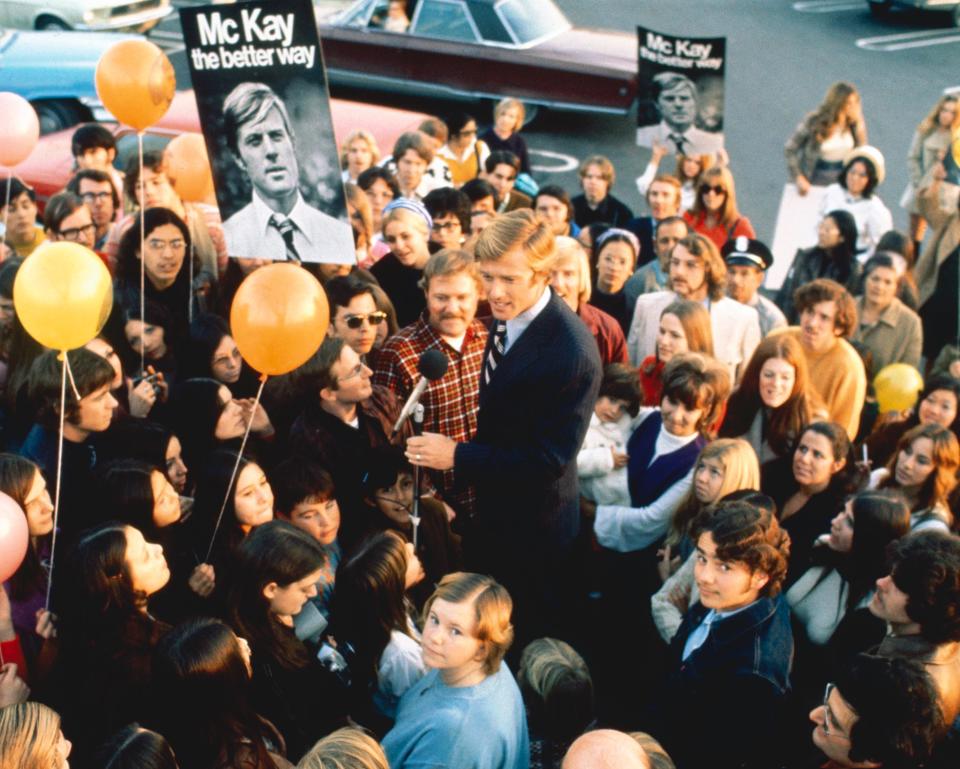
But just a few years earlier, Redford delivered an equally compelling performance in a fictional political drama. In "The Candidate," he plays Bill McKay, a long-shot contender for a U.S. Senate seat in California. Recruited by a grizzled consultant (Peter Boyle), McKay enters the political fray only when assured he will be able to speak his mind and promote his own political issues, rather than stick to conventions. But he learns that in politics, image and perception -- rather than ideas and substance -- are paramount to success.
In November, when honoring Redford with the Presidential Medal of Freedom, President Barack Obama called it "perhaps the best movie about what politics is actually like — ever."
"Milk"

Adding to its political relevance, the film's release in 2008 coincided with the passage of California's Proposition 8, which banned same-sex marriages in the state. In 2013, the U.S. Supreme Court effectively struck down Prop 8, a major victory for LGBTQ rights.
"Mr. Smith Goes To Washington"
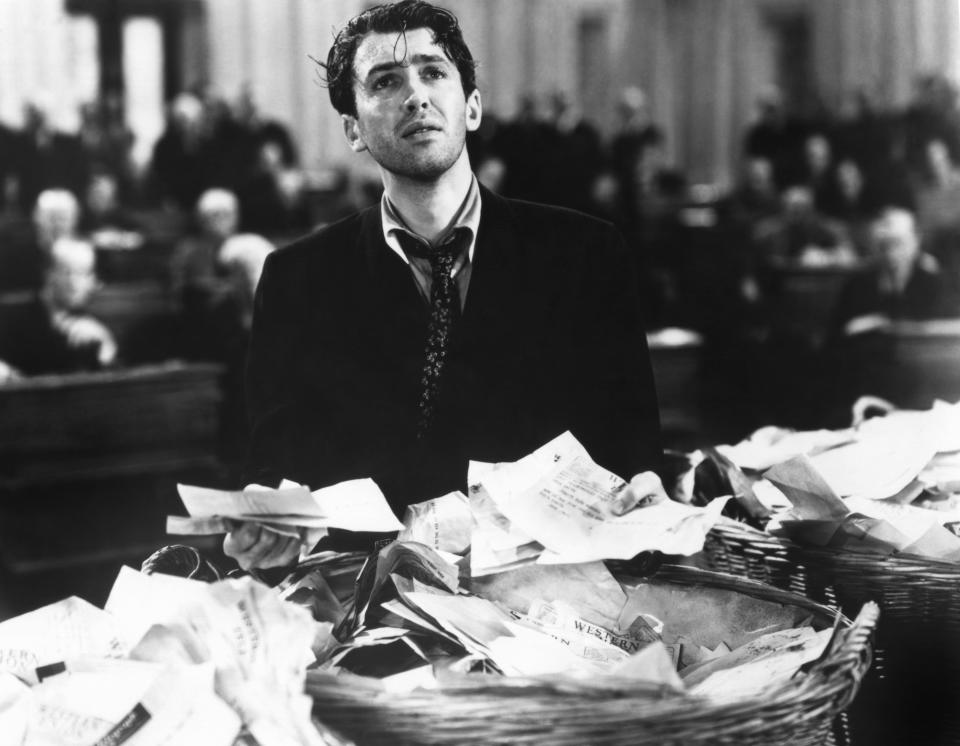
Now considered a classic (in 2007, the American Film Institute ranked it 26 on its list of 100 greatest movies), the film was initially panned by politicians for its stark depiction of corruption and greed. At the time, U.S. Ambassador Joseph P. Kennedy Sr. called it “one of the most disgraceful things I have ever seen done to our country,” and Senate Majority Leader Alben Barkley (D-Ky.) said the film "makes the Senate look like a bunch of crooks."
"Primary Colors"
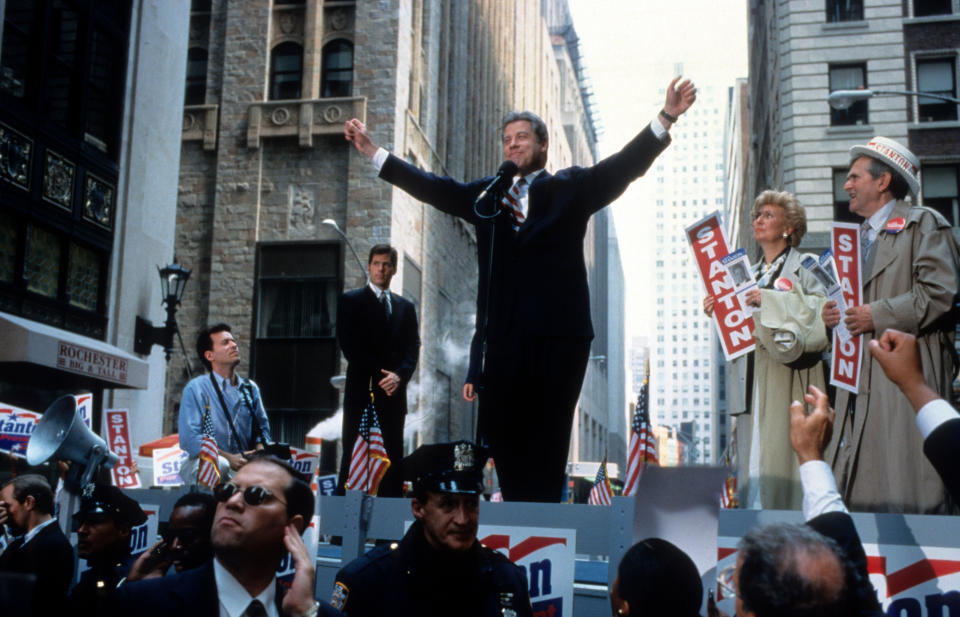
Based on a novel by veteran political reporter Joe Klein, "Primary Colors" is uneven at times -- some of the jokes don't totally land and some of the acting looks cartoonish. But it definitely delivers on the '90s political nostalgia, and its depiction of politics as an ugly and thankless blood sport paved the way for TV shows like "House of Cards." Bonus: Look for the tough-as-nails political operative played by Kathy Bates, who makes every movie better.
"Dr. Strangelove Or: How I Learned To Stop Worrying And Love The Bomb"
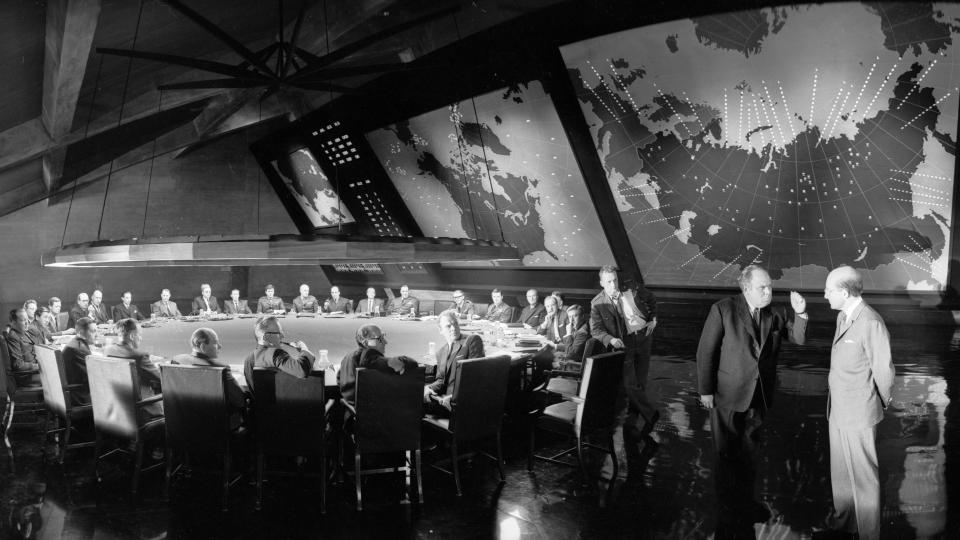
"Dr. Strangelove" contains layers upon layers of comedy, from funny character and place names (Ripper commands the Burpelson Air Force Base) to absurd imagery (the giant maps in the war room). And remember: There's no fighting in the war room.
This article originally appeared on HuffPost.

